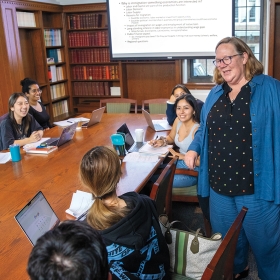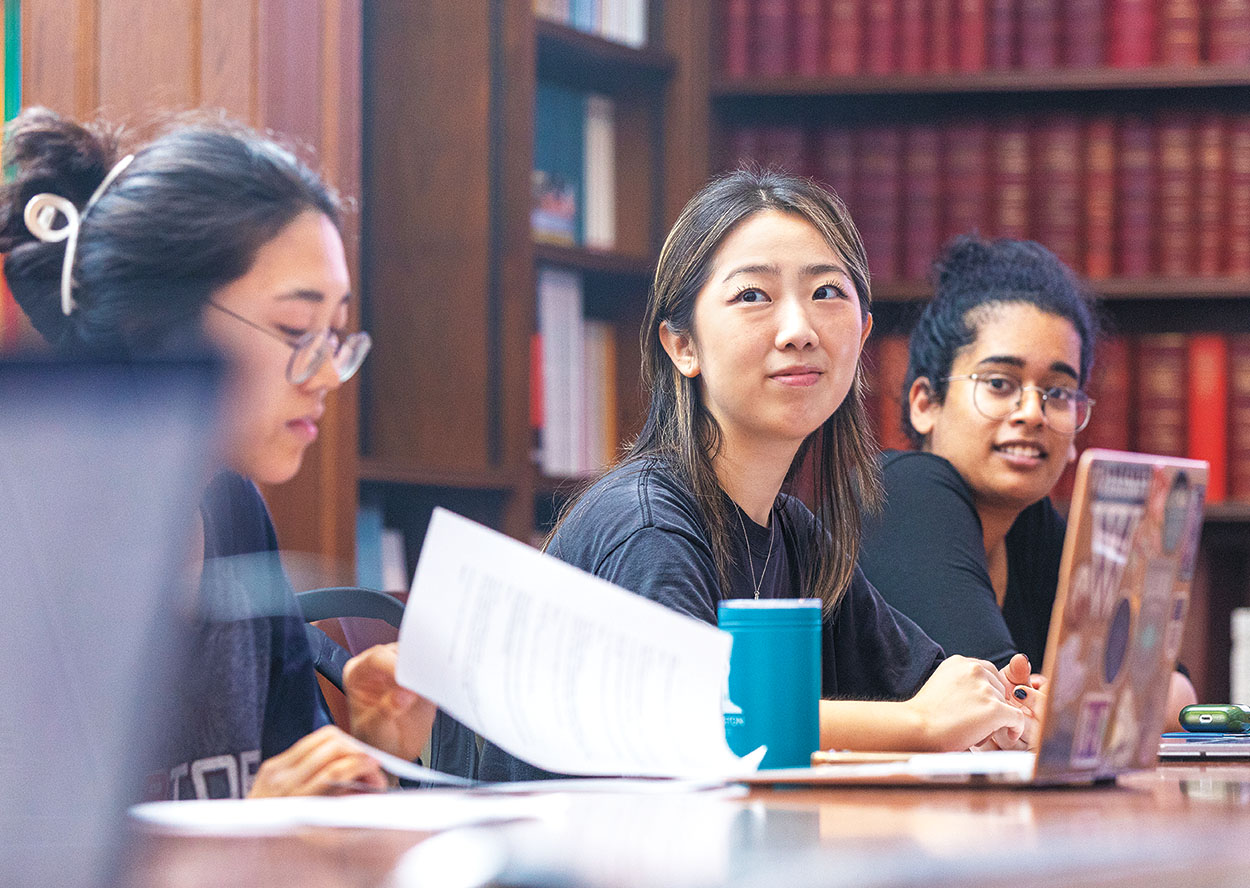“Women who enroll at Wellesley are about 7 percentage points more likely to major in economics, and that’s [almost] double the chances of majoring in economics at other institutions where non-enrollees went,” says Patrick McEwan, Professor of Economics and Luella LaMer Slaner professor in Latin American Studies. The question is why.

Kristin Butcher ’86 teaches Econ 311: Economics of Immigration, in Pendleton East.
Just because it’s hard to quantify what makes Wellesley so special doesn’t mean some professors in the economics department won’t try. Particularly if the question is: Why does it seem like Wellesley graduates so many more women econ majors than other institutions?
Because, as it turns out, that notion isn’t just legend. “It’s always been lore that if you meet a woman economist, there’s a good chance she went to Wellesley,” says Kristin Butcher ’86, Marshall I. Goldman Professor of Economics at the College. “But as economists, we like to go beyond the lore and ask, is it actually true in the data? Do we actually do what this lore claims, which is educate a disproportionate share of economists?”
Quite simply: Yes. “Women who enroll at Wellesley are about 7 percentage points more likely to major in economics, and that’s [almost] double the chances of majoring in economics at other institutions where non-enrollees went,” says Patrick McEwan, Professor of Economics and Luella LaMer Slaner professor in Latin American Studies. But why? “What we tried to do was to see how much of this ‘Wellesley effect’ could be explained by features that Wellesley shares with other institutions and how much remains as a Wellesley-specific effect,” says Akila Weerapana, professor of economics.

Butcher, McEwan, and Weerapana teamed up to tackle these and other questions in their recent working paper, “Women’s Colleges and Economics Major Choice: Evidence from Wellesley College Applicants.” The trio analyzed anonymized data from admitted applicants to Wellesley between fall 1999 and fall 2013, and compared enrollees to Wellesley with non-enrollees (that is, students who were admitted to Wellesley but chose to go elsewhere). The data encompassed information from the Office of Admission and the Office of Institutional Research, as well as from the National Student Clearinghouse, to gather data points on eventual degree outcome, as well as other factors like SAT scores, original expressed major interest, and even whether or not the student attended a single-sex high school.
“Our broad agenda is just trying to understand the determinants of women’s choices and ultimate success in higher education, and one major piece of that puzzle is how you choose a major, and especially how you choose a major in a field like STEM or economics, or another mathematically intensive major where women are historically underrepresented,” McEwan says. “Only a social scientist could say, we want to measure up all the little elements that make Wellesley special and ask if they nudge students to pursue economics. But we really did try to do that.”
“I don’t think that I would be an economist now if I hadn’t gone to Wellesley.”
The results may seem unsurprising to some—Wellesley is a women’s college, after all, so it makes sense that the College graduates more female majors in a traditionally male-dominated field like economics. “But the magnitude of the effect, for me, at least, was not something that I was expecting,” says Weerapana. After their initial results, McEwan even started doing “little data errands” to confirm the effect, like comparing five years of economics graduates from Wellesley with the same number at Harvard—and yes, Wellesley had more, despite its significantly smaller size. “It comes down to: You’re dramatically more likely to major in economics as a female undergraduate at Wellesley than Harvard,” McEwan says.
For Butcher, a Wellesley economics major herself, the results weren’t as surprising. “I don’t think that I would be an economist now if I hadn’t gone to Wellesley. My experience being a young woman who liked math was extremely isolating in high school,” she says. “Going to Wellesley just felt like a weight was lifted from my shoulders, because nobody ever questioned my right to be in any room.”
Butcher’s anecdotal evidence points to some of the factors the paper identifies as contributing features of the Wellesley effect: the women’s college environment and the proportion of female peers, but also the number of female instructors. As it turns out, women’s colleges are more likely to have a more gender-balanced faculty in traditionally male-dominated fields. But even when compared to other women’s colleges, Wellesley still comes out ahead. “We specifically do very well in economics,” Butcher says. “It’s a pretty comprehensive effect.”
[substory:1]

